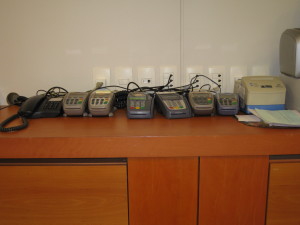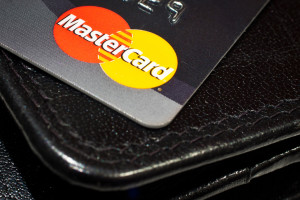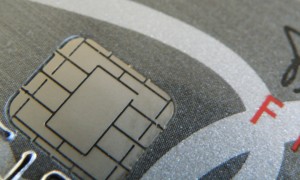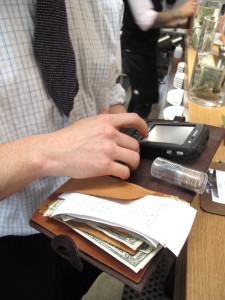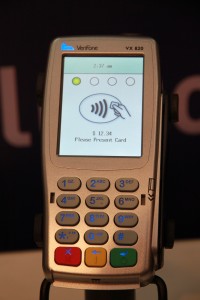June 5th, 2014 by Elma Jane
The days of salespeople peddling point of sale terminals by simply pulling hardware out of a box are numbered. That model is being replaced by integrated payments from software developers who add payment capabilities to applications that run at the point of sale, in the back office or on mobile devices.
Integrated payments are becoming common in the restaurant industry, where systems are developed to combine payment acceptance with the ability to manage orders, tables and food delivery. As integrated payments become more common, companies working in the payments industry will seek ways to offer marketing analytics. You tie that type of data to the payment mechanism and you can learn more about your business and your customers.
There is a place in the ecosystem for traditional payment acceptance, but today, when a retailer shops for a point of sale terminal or other business solutions, they expect payments to be part of the integrated bundle. Many of these systems are now delivered in a software-as-a-service model or through tablets, making them cost-effective for businesses of any size.
Integrated commerce includes mobile acceptance, offers, coupons and loyalty. It enables a merchant to buy a point of sale system for the physical store, website and mobile environment at the same time. Then the merchant can send out offers and begin running a loyalty program, while accepting NFC transactions all at once. Merchants can also review transactions from all channels directly from their offices to monitor against data breaches. With those integrated services becoming more readily available for merchants, it is not surprising that the topic comes up when executives discuss their company’s goals.
Relationships with merchants through integrated payments tend to be sticky because it is an embedded solution. You tend to get better pricing because it’s not necessarily an acquiring decision but a POS software/hardware decision and acquiring is part of that package. Payments as a service will be an important global product, selling a terminal now means selling data security, warranty and service, and numerous merchant tools.
Posted in Best Practices for Merchants, Credit Card Reader Terminal, Point of Sale Tagged with: breaches, coupons and loyalty, data, data breaches, data security, global product, integrated bundle, Integrated commerce, integrated payments, integrated services, loyalty program, marketing analytics, merchant, merchant tools, mobile, Mobile Devices, NFC transactions, payment, payment mechanism, payments industry, point of sale, POS software/hardware, Security, tablets, terminal, terminals, traditional payment, warranty and service, website and mobile environment
May 15th, 2014 by Elma Jane
Selling merchant accounts can be a very profitable venture. It’s not an easy task by any means. It takes hours of work, a strong knowledge of the payment processing industry, dedication and the ability to be told NO many times and still keeping at it. It is often first done successfully as a part time job, because it takes time to build up a residual stream large enough to live off of.
More that 50% of all people that start out to sell merchant accounts never make it and maybe 10% are profitable enough to stick with it. Once the person has found the right company like National Transaction to work with and the ability to sell merchant accounts, they can make a very good living from it.
Statistically, an average merchant account will give a sales agent about $30/month to $11,000/month in residual income. Sandler one of our Sales Rep. who’s into insurance company, had a fall out with his brother came in the office did some orientation and had all the support and tools that he needs, did some phone calls and in a month landed a good deal!!! 11,000/monthly residual for Sandler.
If a sales agent can sign 10 accounts per month, they will be making $3600 per month at the end of the first year or $36,000 per year. At the end of the second year $72,000 per year and at the end of the third year $108,000 per year which is a very decent salary. (Take note that the above average statistics may vary). It really depends on what type or existing portfolio a Sales Rep have or the net volume of the merchant accounts they closed in. As long as the agent keeps signing accounts their income will keep growing. But 10 accounts per month is not an easy task especially for someone new to the merchant services industry. Also, overtime attrition shows up and the average number of accounts a person can setup goes down. But with the help of National Transaction’s Support Sales Team, tools and leads you can make it.
With National Transaction, there’s a lot of Sales Representatives from different walks of life who became successful in this field. From a couple who teamed up and build their own portfolio, to a plain housewife, a teacher, ordinary people who doesn’t know anything about merchant accounts selling or not really into sales marketing, but made it big.
Sales Marketing is not for everybody, but if the company like NTC is giving you all the tools and the support that you need to make it, like orientation, classroom training twice a week, even helping you out close a deal through our Sales Support Team then that’s Awesome!
National Transaction give upfront commissions (NTC pay within a couple of business days), not only that, NTC do High Risk credit card processing services, not all merchant service provider does the same thing. National Transaction provides you prequalified leads and appointment set up, you can also call our 24/7 customer service if you need any help. You do not have to purchase a unit or invest in provided leads or anything because NTC wants all their Sales Representative to succeed.
Also in this field you can work from home or be at the office at your own flexible time. As long as you have set your own quota for the day. If you want to be a successful Sales Representative and earn 60,000 or more monthly residual then sign up with National Transaction and make that dream of yours come true, just like our existing Sales Representatives.
Posted in nationaltransaction.com Tagged with: customer service, insurance, insurance company, merchant, merchant accounts, National Transaction, payment industry, payment processing industry, prequalified, sales, Sales Marketing, Sales Representatives
May 7th, 2014 by Elma Jane

NTC’s New Approach On Payment Processing brings Client Satisfaction
About NTC (National Transaction Corporation)
NTC is a credit card processing company that was built uniquely. Combining leading edge technology with passion for customer service, as well as service to help customers maximize the value of their merchant service program. NTC provides sales agents, financial institutions and merchants with benefits not available from other providers, such as next day funding with a late cut-off time and unparallel graphical and web-based reporting.
To learn more visit http://www.nationaltransaction.com or call 888-996-2273.
Marking a 65% increase over 2012 NTC now serves approximately 15,000 businesses.
This rapid growth was driven by the many unique benefits that NTC offers its merchants and sales partners, ranging from best technology to superior customer service.
The major differentiators made possible by NTC’s proprietary back-end processing system is the Next Day Funding Service. Because NTC connects directly to the following: Amex, Discover, MasterCard and VISA. This way sales partners and merchants are able to avoid the middleman and go straight to the source of all their processing needs. This also means that the merchants can batch out their terminal POS with one of the latest cut-off times in the industry by as late as 11:00 pm Eastern.
NTC’s another appealing factor to new sales partners and merchants is its merchant connect online reporting system. It provides 24/7 access to graphical account information through a system that is fast easy and secure. Merchants are now able to clearly see and understand their payment processing costs. ISO’s have access to sugar CRM to make notes and see Merchant Marketing Data. Card Numbers are secure on the banks server so our faculty has credentials to access the bank servers.
Independent sales organizations (ISOs) and Merchant sales professionals continue to choose NTC as their payment processing partner to obtain these unique benefits. In addition to industry-leading technology, NTC offers its merchants and sales partners a level of personalized support that is not easily found among other credit card processing companies. They get round the clock account and terminal support. Collective hard work and determination helped NTC grow faster in the industry, resulted in more loyal ISO sales partners who are submitting more applications. Looking forward for continued success for NTC, its sales partners and merchants.
Posted in Credit card Processing, EMV EuroPay MasterCard Visa, Financial Services, Merchant Account Services News Articles, nationaltransaction.com, Point of Sale, Visa MasterCard American Express Tagged with: amex, back-end processing, bank, bank servers, card, card numbers, credit card processing, credit-card, customer service, Discover, financial institutions, marketing data, MasterCard, merchant, merchant connect, merchant service, next day funding, payment processing, POS, provider's, sales agents, sales partners, sugar CRM, terminal, visa, web-based
March 31st, 2014 by Elma Jane
A payment processor is a company often a third party appointed by a merchant to handle credit card transactions for merchant acquiring banks. They are usually broken down into two types: Back and Front-End.
Back-End Processors accept settlements from Front-End Processors and, via The Federal Reserve Bank, move the money from the issuing bank to the merchant bank.
Front-End Processors have connections to various card associations and supply authorization and settlement services to the merchant banks’ merchants. In an operation that will usually take a few seconds, the payment processor will both check the details received by forwarding them to the respective card’s issuing bank or card association for verification, and also carry out a series of anti-fraud measures against the transaction.
Additional parameters, including the card’s country of issue and its previous payment history, are also used to gauge the probability of the transaction being approved.
Once the payment processor has received confirmation that the credit card details have been verified, the information will be relayed back via the payment gateway to the merchant, who will then complete the payment transaction. If verification is denied by the card association, the payment processor will relay the information to the merchant, who will then decline the transaction.
Modern Payment Processing
Due to the many regulatory requirements levied on businesses, the modern payment processor is usually partnered with merchants through a concept known as software-as-a-service (SaaS). SaaS payment processors offer a single, regulatory-compliant electronic portal that enables a merchant to scan checks “often called remote deposit capture or RDC”, process single and recurring credit card payments (without the merchant storing the card data at the merchant site), process single and recurring ACH and cash transactions, process remittances and Web payments. These cloud-based features occur regardless of origination through the payment processor’s integrated receivables management platform. This results in cost reductions, accelerated time-to-market, and improved transaction processing quality.
Payment Processing Network Architecture
Typical network architecture for modern online payment systems is a chain of service providers, each providing unique value to the payment transaction, and each adding cost to the transaction. Merchant>Point-of-sale SaaS> Aggregator >Credit Card Network> Bank. The merchant can be a brick-and-mortar outlet or an online outlet. The Point-of-sale (POS) SaaS provider is usually a smaller company that provides customer support to the merchant and is the receiver of the merchant’s transactions. The POS provider represents the Aggregator to merchants. The POS provider transaction volumes are small compared to the Aggregator transaction volumes. The POS provider does not handle enough traffic to warrant a direct connection to the major credit card networks. The merchant also does not handle enough traffic to warrant a direct connection to the Aggregator. In this way, scope and responsibilities are divided among the various business partners to easily manage the technical issues that arise.
Transaction Processing Quality
Electronic payments are highly susceptible to fraud and abuse. Liability to merchants for misuse of credit card data creates a huge expense on merchants, if the business were to attempt mitigation on their own. One way to lower this cost and liability exposure is to segment the transaction of the sale from the payment of the amount due. Some merchants have a requirement to collect money from a customer every month. SaaS Payment Processors relieve the responsibility of the management of recurring payments from the merchant and maintain safe and secure the payment information, passing back to the merchant a payment token. Merchants use this token to actually process a charge which makes the merchant system fully PCI-compliant. Some payment processors also specialize in high-risk processing for industries that are subject to frequent chargebacks, such as adult video distribution.
Posted in Best Practices for Merchants, Credit card Processing, Electronic Check Services, Electronic Payments, Internet Payment Gateway, Merchant Services Account, Payment Card Industry PCI Security, Point of Sale, Visa MasterCard American Express Tagged with: aggregator, aggregator transaction volumes, back end, card associations, card data, chargebacks, credit card transactions, electronic portal, front end, front-end processors, issuing bank, merchant, merchant bank, network architecture, online payment systems, payment gateway, payment processing, payment processor, payment transaction, pci-compliant, point of sale, POS, SAAS
March 14th, 2014 by Elma Jane
Merchant and Consumer Groups Seek Senate Support To Forego EMV Chip and Signature As Breach Concerns Rise
There’s no shortage of answers in trying to put a stop to hackers set on throwing chaos into the way consumers transact at the point of sale, or online for that matter. Yesterday, the Banking, Housing and Urban Affairs subcommittee on national security and international trade and finance got its chance to hear some of them.
During the hearing, William Noonan, deputy special agent in charge, U.S. Secret Service, noted the advances in computer technology and greater access to personally identifiable information online, which have created a virtual marketplace for transnational cyber criminals to share stolen information and criminal methodologies. As a result, the Secret Service has observed a marked increase in the quality, quantity, and complexity of cyber crimes targeting private industry and critical infrastructure. These crimes include network intrusions, hacking attacks, malicious software, and account takeovers leading to significant data breaches affecting every sector of the world economy.
The recently reported data breaches of Target and Neiman Marcus represent only the most recent, well-publicized examples of this decade-long trend of major data breaches perpetrated by cyber criminals intent on targeting the nation’s retailers and financial payment systems. The increasing level of collaboration among cyber-criminals allows them to compartmentalize their operations, greatly increasing the sophistication of their criminal endeavors and allowing for development of expert specialization. These specialties raise both the complexity of investigating these cases, as well as the level of potential harm to companies and individuals.
So how should the industry react to prevent further breaches? Those opinions provided during testimony at the hearing varied widely, though both consumer and merchant groups would like the card networks to give up requiring only signatures for smart card purchases at the point of sale.
Consumer program director at the U.S. Public Interest Research Group, called for myriad of changes, citing that the greater risk from the recent breaches is less related to identity theft than it is to fraud on existing accounts, and he said it’s time for players on both sides of the transaction to focus more on protecting consumers than on managing their own risk.
Until now, both banks and merchants have looked at fraud and identity theft as a modest cost of doing business and have not protected the payment system well enough. They have failed to look seriously at harms to their customers from fraud and identity theft -including not just monetary losses and the hassles of restoring their good names, but also the emotional harm that they must face as they wonder whether future credit applications will be rejected due to the fraudulent accounts.
As a first step, Congress should institute the same fraud cap, $50, on debit/ATM cards that exists on credit cards, or eliminate the $50 cap entirely, since it is never imposed because of the zero-liability policies issuers have voluntarily have imposed. Congress also should provide debit and prepaid card customers with the stronger billing-dispute rights and rights to dispute payment for products that do not arrive or do not work as promised, just as many credit card users enjoy.
Congress should endorse a specific technology, such as EMV smart cards and if it does, require the use of PINs when initiating smart card transactions. The current pending U.S. rollout of chip cards will allow use of the less-secure chip-and-signature cards rather than the more-secure chip-and-PIN cards. Why not go to the higher-and-PIN authentication standard immediately and skip past chip and signature? There is still time to make this improvement.”
Retailers have spent billions of dollars on card-security measures and upgrades to comply with PCI card security requirements, but it hasn’t made them immune to data breaches and fraud. The card networks have made those decisions for merchants, and the increases in fraud demonstrate that their decisions have not been as effective as they should have been.
The card networks should forego chip and signature and go straight to chip and PIN. To do otherwise would mean that merchants would spend billions to install new card readers without they or their customers obtaining PINs’ fraud-reducing benefits. We would essentially be spending billions to combine a 1990’s technology chips with a 1960’s relic signature in the face of 21st century threats.
Posted in Best Practices for Merchants, Credit card Processing, Credit Card Reader Terminal, Credit Card Security, Digital Wallet Privacy, Electronic Payments, EMV EuroPay MasterCard Visa, Financial Services, Merchant Services Account, Payment Card Industry PCI Security, Point of Sale, Small Business Improvement, Visa MasterCard American Express Tagged with: banking, Breach, card networks, card-security, chip and signature, chip cards, chip-and-PIN cards, computer technology, credit applications, credit cards, critical infrastructure, cyber crimes, cyber-criminals, data breaches, debit atm cards, EMV, hackers, hacking attacks, international trade and finance, malicious software, managing risk, merchant, national security, netwrok intrusions, new card readers, online, payment system, pci card security requirements, PIN, point of sale, prepaid card customers, smart card transactions, technology chips, the secret service, transnational cyber criminals, virtual marketplace, world economy
February 18th, 2014 by Elma Jane
Payment Tokenization Standards
Tokenization is the process of replacing a traditional card account number with a unique payment token that is restricted in how it can be used with a specific device, merchant, transaction type or channel. When using tokenization, merchants and digital wallet operators do not need to store card account numbers; instead they are able to store payment tokens that can only be used for their designated purpose. The tokenization process happens in the background in a manner that is expected to be invisible to the consumer.
EMVCo – which is collectively owned by American Express, Discover, JCB, MasterCard, UnionPay and Visa – has announced that it is expanding its scope to lead the payments industry’s work to standardize payment tokenization. EMVCo says that the new specification will help provide the payments community with a consistent, secure and interoperable environment to make digital payments when using a mobile handset, tablet, personal computer or other smart device.
Key elements of EMVCo’s work include adding new data fields to provide richer industry information about the transaction, which will improve transaction efficiency and enhance the consumer and merchant payment experience by helping to prevent fraudulent card account use. EMVCo will also create a consistent approach to identify and verify the valid use of a token during payment processing including authorization, capture, clearing and settlement.
EMVCo’s announcement follows an earlier joint announcement from MasterCard, Visa and American Express that proposed an initial framework for industry collaboration to standardize payment tokenization. EMVCo says it will now build on this framework with collective input from all of its members and the industry as a whole.
Posted in Credit card Processing, Credit Card Reader Terminal, Credit Card Security, Digital Wallet Privacy, Electronic Payments, Financial Services, Payment Card Industry PCI Security, Visa MasterCard American Express Tagged with: American Express, authorization, capture, card account numbers, clearing, data fields, device, digital payments, Digital Wallet, Discover, EMV, emvco, fraudulent card account, interoperable, jcb, MasterCard, merchant, mobile handset, payment, payment processing, payment token, secure, security standards, settlement, smart device, specification, standardize, tablet, token, tokenization, transaction, visa
January 23rd, 2014 by Elma Jane
Commonwealth Bank of Australia (CBA) will now offer the embedded payments service to customers that use the Samsung Galaxy S4 and have CBA’s mobile banking app. MasterCard indicated that this development allows these customers to make payments at more than 1.6 million PayPass-enabled merchant locations around the globe.
MasterCard is just one major issuer that views embedded chips in NFC-enabled phones as the key to unlocking mobile payments globally. But, its news yesterday of how it is going to leverage its Samsung partnership puts a bit of a different spin on digital wallets and mobile payments.
“Our focus is on helping consumers shop and pay in a way that best fits their needs, across all of their devices,” Mung Ki Woo, group executive of mobile and industry alliances at MasterCard, said in a December 11 statement.
The move is part of MasterCard’s continued relationship with Samsung. Earlier this year, MasterCard teamed with the handset maker to offer exclusive deals and special discounts to Samsung Galaxy S4 users in Bangladesh.
Posted in Electronic Payments, Financial Services, Mobile Payments, Mobile Point of Sale, Near Field Communication, Smartphone, Visa MasterCard American Express Tagged with: commonwealth, devices, Digital wallets, embedded payments, make payments, MasterCard, merchant, mobile banking app, Mobile Payments, nfc-enabled phones, paypass, Samsung, shop and pay
December 5th, 2013 by Elma Jane
Three key benefits mPOS can provide PSPs. mPOS:
1. Maintains A Continuity Of Operations
mPOS solutions also ease the process of accepting and approving payments, according to the white paper. By enabling face-to-face card present transactions, mPOS allows transactions to be conducted in a highly secure manner. Further, once the encrypted transaction data is decrypted securely by the PSP at the payment gateway (with no access granted to the merchant), the onward presentation of the data into the acquiring network is consistent with that used historically for traditional POS terminals.
2. Simplifies Merchant Support
Thales suggests the biggest benefit to PSPs is that mPOS reduces the variety of costs PSPs need to cover to support merchants, cutting expenses related to equipment, security and PCI DSS compliance. This, the white paper says, allows PSPs that utilize mPOS to better allocate resources toward handling higher transaction volumes and acquiring business.
3. Supports Both Magnetic Stripe and EMV Cards
Another benefit to PSPs is that mPOS, despite its recent entrance to the market, is already widely available. The white paper explains that since the mPOS revolution quickly migrated from the U.S. abroad, mPOS solutions now exist to serve the unique needs of both markets. While this means challenges for merchants operating globally, PSPs benefit from being able to address the needs of merchants who want to opt for any and all available market solutions.
Much has been said about the recent explosion of the mobile point-of-sale (mPOS) market and how micromerchants are driving this payments revolution. But, what this story doesn’t communicate effectively is that small merchants aren’t the only stakeholders benefiting from the ongoing mPOS migration.
Payment service providers (PSPs) are another member of the mPOS value chain that can gain flexibility and security through these solutions, new research from data protection solution provider Thales suggests.
“Both merchants and PSPs have operational and logistical issues with traditional POS terminals associated mainly with the highly controlled and certified environment in which they must be used,” Thales writes in its latest white paper on the topic, “mPOS: Secure Mobile Card Acceptance.”
The 27-page white paper provides an extensive overview of the ongoing POS revolution, explaining how mPOS can reduce friction and costs for merchants, illustrating how the technology works step-by-step and highlighting the roles that each stakeholder plays along the value chain.
Posted in Electronic Payments, Mobile Payments, Mobile Point of Sale, Payment Card Industry PCI Security, Point of Sale, Smartphone Tagged with: acceptance, acquiring network, card present, compliance, decrypted, DSS, emv cards, encrypted, face-to-face, magnetic stripe, merchant, micromerchants, migration, mobile card, mobile point of sale, MPOS, payment gateway, payment service providers, payments, PCI, POS, psps, secure, securely, Security, terminals, transactions
November 21st, 2013 by Elma Jane
Eco Tips For Greening Business. Creating a greener office can result in a healthier and more productive work place, a lighter ecological footprint, increased staff morale and good news for your bottom line. So whether you work in an office, shop or factory, run your own business or manage a corporation… taking care of the environment is easier than you think.
Here’s some simple, yet effective tips for going green at work by saving energy, conserving natural resources and reducing landfill and preventing pollution.
A Switch to 100% Recycled Office Paper. Every tonne of paper recycled can save 17 trees. The best paper to buy is bleach-free, 100% post-consumer recycled paper (usually off-white or brown in color), because it uses up to 90 per cent less water and half the energy required to make paper from virgin timber, creates demand for waste paper that would normally end up in landfill, and no trees are cut down to make the paper. Genuine recycled paper is 100% made from post-consumer waste. This means the paper has been used at least once by consumers, collected, and reconverted to pulp to make paper again. But check the fine print because some paper manufacturers call paper recycled even when it uses pre-consumer waste… meaning pulp that never left the factory. A business is not truly recycling unless it buys recycled products.
Changing A Light Bulb. Compact fluorescents are 80% more energy efficient, and last 10 times longer than incandescent light bulbs. A switch from conventional light bulbs to energy efficient compact fluorescents can be one of the most effective things your business can do to reduce emissions and global warming, and it saves you money off your energy bill too.
Green Power. Your business can save tonnes of emissions a year, by switching to renewable sources such as solar, wind and geothermal energy.
Green Printer. Look for a printer who uses vegetable-based inks, and can assist you to choose paper made from sustainable forest fibres or better still, paper recycled from post-consumer waste. Next time you are arranging the printing of your stationery or printing material, get a comparison quote from a ‘green printer’. You might be pleasantly surprised to learn how competitive the costs are compared to traditional, alcohol-based, offset printing.
How White Is Your Paper? When you buy chlorine-free writing and copier paper you’re telling paper manufacturers that you demand safer alternatives. So, choose recycled paper with a high percentage of ‘post consumer’ waste, and look for the ECF or TCF symbols to ensure that environmental harm is minimized. ECF (Elemental Chlorine Free) means pulp is bleached without the use of elemental chlorine gas. Even better, TCF (Totally Chlorine Free) means pulp is bleached avoiding the use of chlorine at all. Paper manufacturers use chlorine to bleach paper bright white. The more chlorine our society uses, the more toxic substances such as dioxin there are in our water, air, soil, and in our bodies.
Implementing Green Cleaning Program. Green cleaning is not only good for the environment; it also increases workplace health and safety. Switch to environmentally responsible cleaning products and services.
Natural Air Filters Are Indoor Plants. Use Indoor plants they are natural air filters which can absorb airborne pollutants and radiation from computers while replenishing oxygen levels.
Put Your PC To Sleep. Save approx. $100 per year off your energy bill for every computer you switch off at the end of the day. If you are away from your computer for less than half an hour, put it in sleep mode, which reduces energy use to about 5% of full operating power. Also next time you’re replacing office computers, remember that laptops and notebooks use up to 90% less energy than a desktop PC. Many office computers never get switched off, needlessly consuming energy overnight and on weekends. A computer left on all day, every day uses 1,000 kilowatts of electricity over a year, producing more than a tonne of carbon emissions.
Recycling Program. Different Councils may have different regulations about what you can recycle. Kerbside collection has changed the face of office and household recycling, making it easier to reduce landfill.
Recycle The Cartridges From Your Printer, Fax And Copier For Free. Contact a free collection service that recycles all your ink jet and toner cartridges and guarantees zero waste to landfill.
Recycle Your Old Mobile Phone. Preserve the environment by keeping unused mobile phone out of landfill and recycling it back to reuse. Look for official industry recycling program that provides a solution to help clean up the environment while at the same time raising much needed funds for charities.
Treat Paper Like It Grows On Trees. Simple recycling measures can significantly reduce your waste removal expenses. Set your computer printing default to double-sided. Print out only what is necessary, and proof read documents carefully on screen to avoid having to print multiple copies. Use a paper tray to collect single-sided printed scrap paper for notes, or reuse it in your photocopier or fax machine. Place a paper recycling box under each desk, and encourage your team to transfer the contents into a centrally located recycling bin when full. Paper comprises up to 70 per cent of office waste, with 10,000 A4 sheets used for every worker each year. That’s equal to 10 million trees.
Waterless Urinals Installation. Every year, billions of litres of fresh drinking water are wasted in urinals flushing. Waterless urinals are best to use, absolutely no water while meeting the highest hygienic standards.
Go Green!!!
Posted in Electronic Payments, Environmentally Green Tagged with: electronic payments environmentally, energy efficient, environmentally green, green, greener office can, greening your business, lighter ecological footprint, merchant, payments environmentally green, service, the environment
October 17th, 2013 by Elma Jane
VeriFone and National Payment Card Association (NPCA) debuted a mobile payment and rewards solution that enables convenience store and petroleum retailers to provide customers with smartphone-based payment options at the pump.
Utilizing VeriFone’s Smart Fuel Controller and NPCA’s mobile payment solution, c-store and gas station operators with VeriFone payment acceptance systems can quickly implement a fixed low-cost mobile payment and rewards program built on existing infrastructure used for merchant branded debit cards.
Consumers are increasingly drawn to rewards-based fuel purchase programs and they expect to be able to use their mobile phone to complete transactions at the pump. NPCA and VeriFone are showing how easy it is for CSPs to offer mobile payment and reward options to customers that increase loyalty and sales.
VeriFone Smart Fuel solutions make it easy for CSPs to offer forecourt pump POS payment without incurring the cost of installing new dispensers. The Smart Fuel Controller combines pump and pay-point support into a single unit, simplifying installation and maintenance, and eliminating the need for third-party interface devices to integrate pay-point management with in-store POS systems.
Merchants can develop their own mobile app, or apply their brand to a mobile app supplied by NPCA, to enable customers to pay for purchases and receive loyalty incentives using their smartphones.
Consumers today would rather utilize the capabilities of their smartphones versus pulling out their wallets. Using this solution, retailers can easily and cost-effectively create mobile loyalty programs that attract and reward high-value customers – without having to replace their existing payment infrastructure.
NPCA’s debit-based payment programs provide retailers with the ability to drive customer loyalty and reduce the cost of payments. Fuel discounts are funded from interchange savings that retailers would otherwise pay to banks. Payment processing is done by NPCA using the automated clearing house (ACH) system to clear debits to cardholder checking accounts and net settle with retailers each day. The company holds five patents related to the processing and methods for ACH-based decoupled debit and mobile payments.
Come November VeriFone and NPCA mobile payments solution will be available for beta testing.
Posted in Electronic Payments, Mobile Payments, Point of Sale, Smartphone, Visa MasterCard American Express Tagged with: acceptance, ach, app, apply, cardholder, consumers, cost, debit cards, devices, infrastructure, interchange, interface, loyalty, merchant, mobile, pay-point, payment, payments, phone, POS, Processing, rewards, sales, smart, Smartphones, solution, transactions, verifone, wallets
